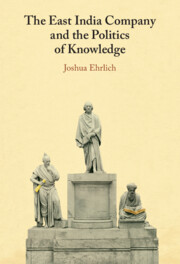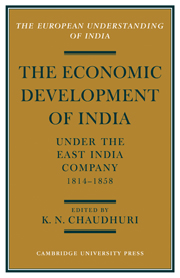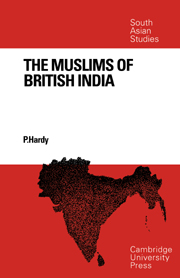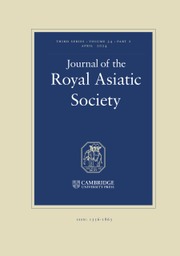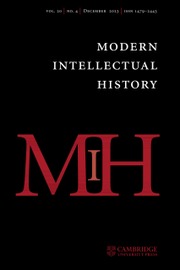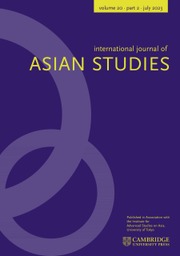The East India Company and the Politics of Knowledge
- Author: Joshua Ehrlich, University of Macau
- Date Published: July 2023
- availability: Available
- format: Hardback
- isbn: 9781009367950
Hardback
Other available formats:
eBook
Looking for an examination copy?
This title is not currently available for examination. However, if you are interested in the title for your course we can consider offering an examination copy. To register your interest please contact [email protected] providing details of the course you are teaching.
-
The East India Company is remembered as the world's most powerful, not to say notorious, corporation. But for many of its advocates from the 1770s to the 1850s it was also the world's most enlightened one. Joshua Ehrlich reveals that a commitment to knowledge was integral to the Company's ideology. He shows how the Company cited this commitment in defense of its increasingly fraught union of commercial and political power. He moves beyond studies of orientalism, colonial knowledge, and information with a new approach: the history of ideas of knowledge. He recovers a world of debate among the Company's officials and interlocutors, Indian and European, on the political uses of knowledge. Not only were these historical actors highly articulate on the subject but their ideas continue to resonate in the present. Knowledge was a fixture in the politics of the Company – just as it seems to be becoming a fixture in today's politics.
Read more- Reveals how ideas about knowledge made up an ideological cornerstone of the East India Company
- Uncovers a world of debate surrounding the political uses of knowledge
- For historians of knowledge, of the East India Company, and of the British Empire in South Asia
Awards
- Short-listed, 2024 The British in India Book Prize, The British in India Historical Trust
Reviews & endorsements
‘This is an important book. Compellingly written, it offers valuable insights into the connections between politics, knowledge, and corporate interests - connections that sit at the core of pressing contemporary debates.’ Kapil Raj, École des Hautes Études en Sciences Sociales
See more reviews‘For its fresh approach, blending the histories of knowledge and political thought; for its persuasive argument, based on deep research in Persian and European-language sources; and for its lucid and elegant style, Ehrlich’s wonderful book will be required reading for historians of the East India Company, South Asia, and the British Empire.’ Rosane Rocher, University of Pennsylvania
‘In a work as ambitious as it is meticulous, Joshua Ehrlich reveals the British conquest of India to have been the work not only of the ‘merchant’ and the ‘sovereign’ but also of the scholar - as much the product of advancing armies and revenue officials as of the translators, historians, surveyors, libraries, learned societies, colleges, gardens, and many more that made the case for how and why to rule that expanding empire. This book offers a compelling account of how debates over scholarship and education shaped the East India Company state, as well as a thought-provoking reflection on the ways in which the power to create and command knowledge has been central to ideologies of global corporate power, from the eighteenth century to today’s ‘information economy.’’ Philip J. Stern, Duke University
‘… [A] powerful and persuasive argument…. [I]mportant and refreshingly innovative…. [A] thoughtful and considered contribution, founded on wide-ranging research into a wealth of archival material and combined with skilful and imaginative analysis…. [P]acks … [a] powerful contemporary punch…. Rarely do historians succeed in arguing so successfully for the relevance of their work in the maelstrom of the present day ….’ John McAleer, H-Soz-Kult
‘The transition of the East India Company from mercantile organization to full-blown colonial power has been the subject of much scholarly discourse, but as Ehrlich (Univ. of Macau) shows, there are still novel ways to approach the topic … This intellectual history elucidates not just the ideology of imperialism but corporate culture as a whole … Recommended.’ M. Chaiklin, Choice
‘[A]n important addition not only to the scholarship on South Asia but also to the literature on the relationship between state and knowledge.’ Sandipan Mitra, Global Intellectual History
‘A must-read for anyone looking for a scholarly but concise account of the colonial origins of education policy in India. It will also immensely help those researching the historical relationship between state and agencies bestowed with knowledge production by the state.’ Soni Wadhwa, Asian Review of Books
Customer reviews
Not yet reviewed
Be the first to review
Review was not posted due to profanity
×Product details
- Date Published: July 2023
- format: Hardback
- isbn: 9781009367950
- length: 280 pages
- dimensions: 236 x 157 x 19 mm
- weight: 0.51kg
- availability: Available
Table of Contents
Acknowledgments
Note on the text
Abbreviations
Introduction
1. Warren Hastings and the idea of conciliation
2. Conciliation after Hastings
3. The politics of the College of Fort William
4. Scholar-officials and the company state in the early nineteenth century
5. Education and the persistence of the company state
Epilogue
Bibliography
Index.
Sorry, this resource is locked
Please register or sign in to request access. If you are having problems accessing these resources please email [email protected]
Register Sign in» Proceed
You are now leaving the Cambridge University Press website. Your eBook purchase and download will be completed by our partner www.ebooks.com. Please see the permission section of the www.ebooks.com catalogue page for details of the print & copy limits on our eBooks.
Continue ×Are you sure you want to delete your account?
This cannot be undone.
Thank you for your feedback which will help us improve our service.
If you requested a response, we will make sure to get back to you shortly.
×
